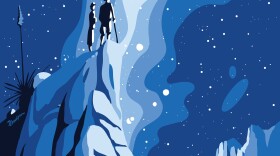
Robert Krulwich
Robert Krulwich works on radio, podcasts, video, the blogosphere. He has been called "the most inventive network reporter in television" by TV Guide.
Krulwich is the co-host of WNYC's Radiolab, a radio/podcast series distributed nationally by NPR that explores new developments in science for people who are curious but not usually drawn to science shows. Radiolab won a Peabody Award in 2011.
His specialty is explaining complex subjects, science, technology, economics, in a style that is clear, compelling and entertaining. On television he has explored the structure of DNA using a banana; on radio he created an Italian opera, "Ratto Interesso" to explain how the Federal Reserve regulates interest rates; he has pioneered the use of new animation on ABC's Nightline and World News Tonight.
For 22 years, Krulwich was a science, economics, general assignment and foreign correspondent at ABC and CBS News.
He won Emmy awards for a cultural history of the Barbie doll, for a Frontline investigation of computers and privacy, a George Polk and Emmy for a look at the Savings & Loan bailout online advertising and the 2010 Essay Prize from the Iowa Writers' Workshop.
Krulwich earned a Bachelor of Arts degree in history from Oberlin College and a law degree from Columbia University.
-
Meet two animals. Both are teeny. Both live in water. Both mature extra fast. But while one dies in about a week, the other — well, prepare to be amazed.
-
Draw a planet (a circle, right?). Now draw a star (a pointy thing, yes?). Now ask yourself, aren't stars all round? Our sun is. So why do we make them pointy? Come learn the answer.
-
We live on a planet, next to a star that's part of a galaxy that's part of ... ah, here comes the new discovery. We are at the very tip of a giant galactic "supercluster." Take a look.
-
If the task is to think backward, to an important moment in history, here's a stunning way to do it: It's a jewel of a monument alongside a road in South Africa.
-
Look up at the night sky and ask, "Anybody there?" Then consider this answer (from the 1830s): There are 22 trillion individuals in our solar system.
-
Tether a balloon to the floor of a car, step on the gas, and watch the balloon do something it shouldn't. Ask why. Then discover the answer. Then feel smart.
-
Nations need borders for security, for revenue, for defense, for identity. But for fun? Introducing borders that giggle.
-
Birds are everywhere, but the greatest concentration of different birds — the "bird mecca" of America — is not in our great parks, not in our forests, not where you'd suppose. Not at all.
-
The year he landed on the moon, astronaut Neil Armstrong was famous, iconic, an American hero. One year later he wasn't. In 1970, how many people remembered his name? This will surprise you.
-
It's just a drop of water. It's about to fall. And when it does, a story begins. What happens next may feel oddly familiar. Maybe it's telling you — about you.






